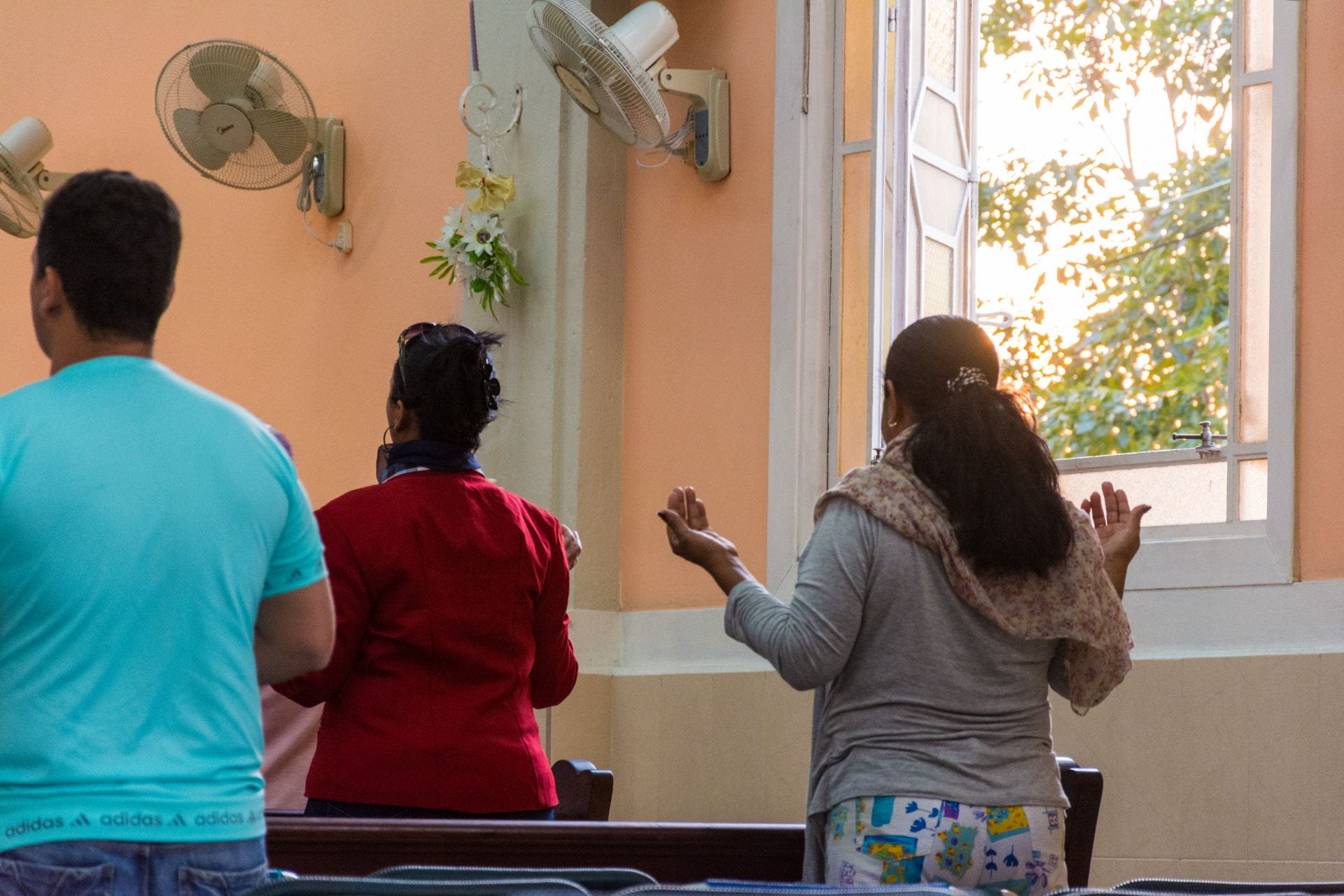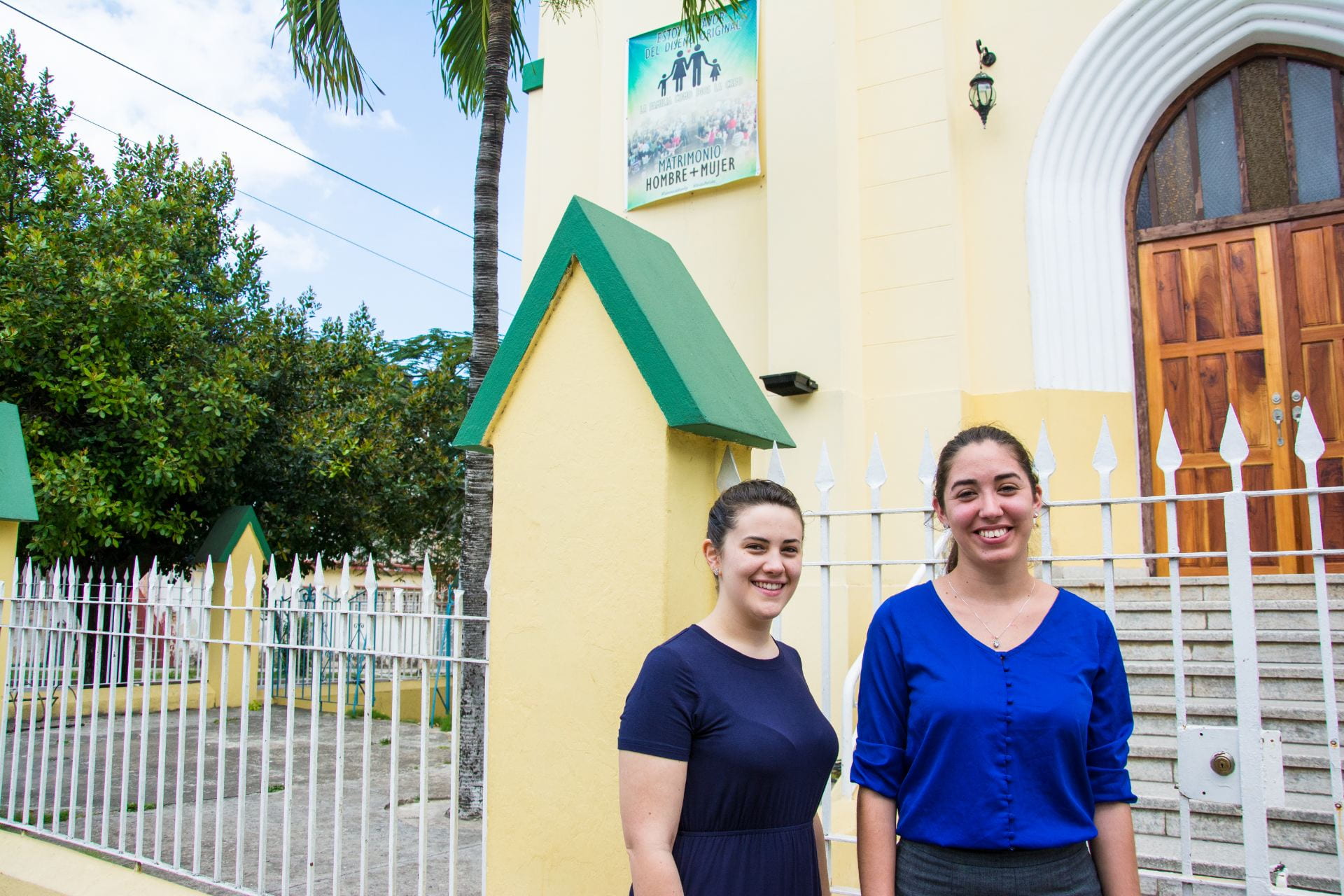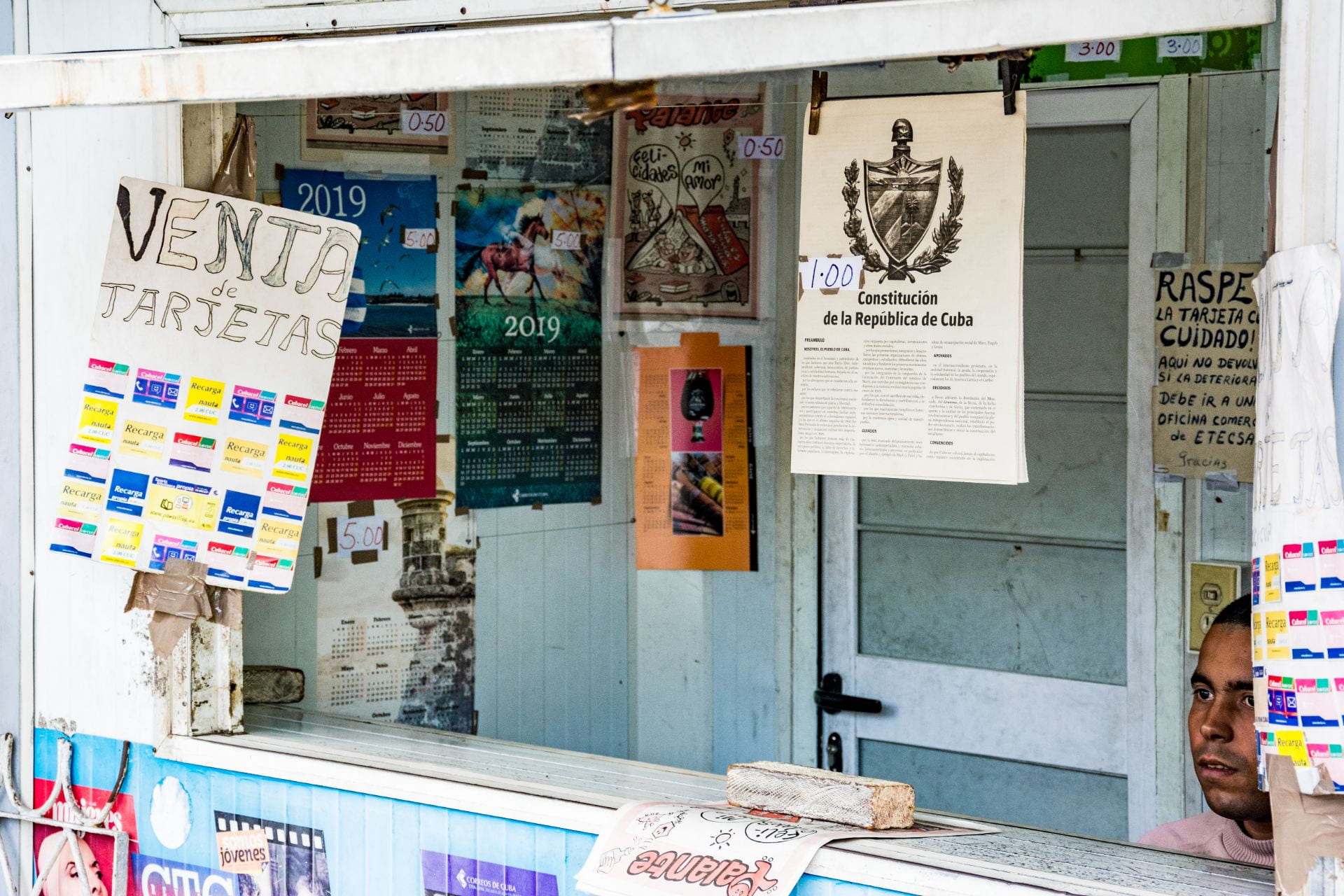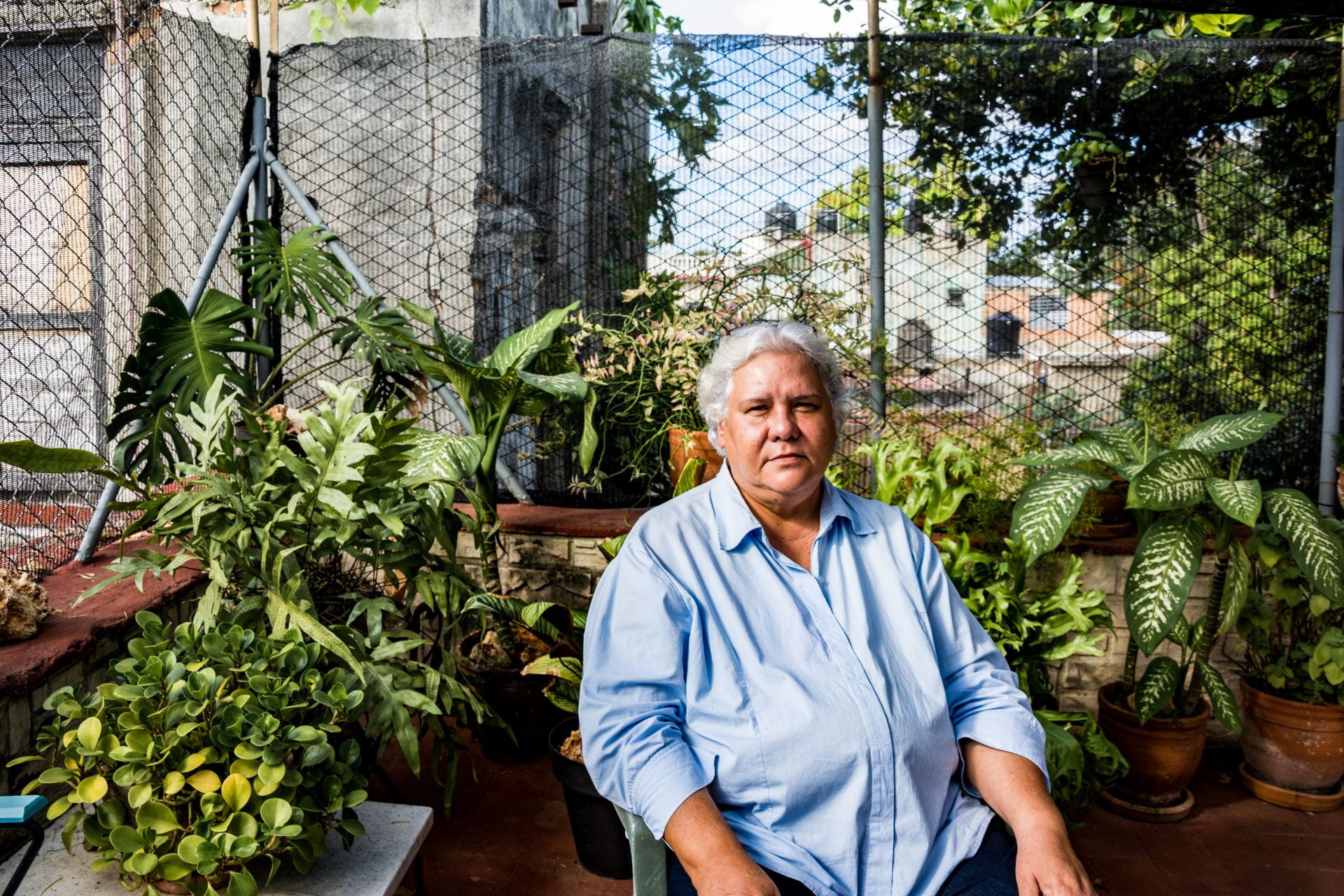Evangelicals surge in Communist Cuba

By Story Hinckley
HAVANA, Cuba – John Wesley rides his horse through the Cuban countryside, beneath tall palm trees and mountains so green they look purple. He holds the reins in one hand and his Bible in the other.
But the painted portrait hanging in Rev. Enoel Gutierrez’s office is fake. There is no record that Wesley, the 18th century Methodist leader, ever came to Cuba, or anywhere else in the Caribbean. Still, Rev. Gutierrez is determined to bring Wesley’s fervor to his island nation. To manifest the painting he commissioned from his imagination.
Religious diversity and participation have flourished in Cuba as the country loosened restrictions on religion over the last three decades, with evangelical denominations like Methodism seeing explosive growth in the past few years.
But it’s more than sermons: Conservative Christianity has become a political force in Cuba, assuming an agenda that has characterized evangelical religions in other countries like the U.S. Churches have become a cornerstone to Cuban communities, and in a country with limited free press and internet access, religious leaders are uniquely positioned to disseminate political opposition in ways the country hasn’t seen in decades.

“As a Christian, we are responsible for the whole education of the person,” says Gutierrez, sitting on a couch beneath the Wesley painting in his office at the Methodist seminary in Central Havana. “We need to go to the people and help the people see the reality of the country, the reality of the politics, because many people don’t have access to that information.”
Evangelicals openly opposed the government’s recent constitutional referendum that included language to legalize gay marriage and outlaw discrimination based on gender or sexual orientation. In September, dozens of evangelical leaders published a letter of opposition and one week before the vote, hundreds of heterosexual couples wearing their wedding clothes gathered in protest on the Malecón, a central roadway along the Havana coast.
The referendum passed on Feb. 24, but evangelicals succeeded in making their point: The government walked back a more liberal version that had redefined marriage as “a union between two people.” Now the constitution is silent on the issue of same-sex marriage, with the government signaling a more definitive definition of marriage to come within the next two years. Though a minority, it’s clear evangelicals managed to tap into a larger sentiment opposing same-sex marriage that pervades much of Latin America, say experts. Almost 14 percent of voters opposed ratification or left the ballot blank, and more than 15 percent of Cubans stayed home from the polls. That’s a much smaller turnout from the 1976 constitution, which passed with 99 percent of the vote.
And evangelicals say they will continue to speak out against politics they oppose. Weeks after the vote, churches across Havana kept posters taped to their doors of four stick figures holding hands (a man and a woman with their two children) and the phrase “I am in favor of the original design.”
Not the same Cuba
“John Wesley said without social holiness, we have no personal holiness,” says Gutierrez, referring to the beloved Methodist leader who traveled so much by horse to preach that it’s said he could have circled the Earth 10 times. “Holiness cannot be inside these walls.”

Hundreds of congregants raise their hands in the air at a Saturday morning service at Iglesia Metodista de Marianao in southwest Havana, shaking with enthusiasm as Pastor Leidy Guerra speaks in a rhythmic chant about understanding the Bible. Don’t just read it, says Pastor Guerra, but really live it. Even when the odds seem too great to overcome.
When the service ends, the church erupts in kisses. Cubans greet each other with an audible kiss on one cheek – and the more kisses on one cheek, the more meaningful and intimate the greeting. The kisses aimed at Pastor Guerra and Danielle Byerly, a visiting missionary from Asheboro, North Carolina, who worked with the church in 2017 and 2018, echoed throughout the church.
Ms. Guerra’s eyes open wildly when asked if she has seen the church grow during her past four years as a pastor. About 70 people have joined annually, with the congregation now totaling about 3,000. Many of the new congregants are women, says Guerra, and about 40 percent are under the age of 30. They are exhausted, she says, from daily struggles such as finding enough food to feed their families.
“Cuba is not the same as it was 20 years ago,” says Guerra. “People are now more thirsty. They need a solution.”
But this desperation has fostered a distinct religious passion in Cuba, says Ms. Byerly, whose church in North Carolina is one of many U.S. congregations that have partnered with Cuban counterparts over the last few years. Although they are teaching the same lessons and principles, she says Cuban services have an originality about them. Instead of a chore they feel like a celebration.
“In the U.S., if you want something you can go work for it,” says Ms. Byerly. “You can’t do that here so here you need that hope in God.”
Part of evangelical churches’ popularity is practical: They have offered tangible and unprecedented solutions to Cubans in recent years. They have spread their reach into local communities through benefits that are common of churches in the U.S. – such as cooking meals for the elderly or tutoring the young – but new to Cubans.
“Now [the church] is not just a place for praying,” says Arturo Lopez-Levy, a political scientist at New York University. “it’s a place for community.”
When a deadly tornado ripped through Cuba in January, churches responded immediately. Alain Gonzalez, 18, who joined Vedado’s University Methodist Church a few years ago, says congregants stayed after services to fill trash bags with clothes and food for tornado victims.
Mr. Gonzalez, who had been idling on the steps of his church waiting for an evening service to begin, pulls his cell phone from his pocket and begins thumbing through photographs. He stops on one of a mound of trash bags that was taller than he.
Opening doors
“Look at we did,” says Gonzalez, proudly. “And that’s only from the collection at one service.”
Just as John Wesley’s ministry was characterized hundreds of years ago by the pastor’s propensity to preach outdoors and offer opinions on social issues, so have evangelical pastors in Cuba made their own mark. But their ability to do either of these is relatively new.
Shortly after taking over the government in 1959, Fidel Castro declared Cuba an atheist state, fearing religion as a competing force for people’s faith. Mr. Castro cancelled Christmas and shipped boats of pastors overseas to Spain. Churches, many of which were Catholic, moved underground.
Decades later during “the Special Period,” when many Cubans starved and lacked basic necessities after the fall of the Soviet Union, Mr. Castro reversed his ban on religion. In 1992, in what was largely seen as an effort to boost Cuban moral and quiet political opposition, Mr. Castro permitted membership to both the Communist party and the Catholic church.
During the next few years, churches slowly began to open their doors. Then when Raul Castro took over the presidency in 2008 from his brother, religion again took another leap forward on the island. Pews began to fill up. In 2015, Raul Castro talked about returning to the Catholic church himself, and Pope Francis even played a mediator role in talks between Cuba and the Obama administration.
But the country’s 21st century religious revival has also had noticeable breadth. Santería, a centuries-old religion particular to Cuba founded by African slaves, is now practiced more openly. A young Jewish community is growing and since 2005, the island’s Muslim community has increased from 500 members to 7,000.
And while a 2015 survey by Univision and Fusion found that only 5 percent of the country identified as evangelical, totalling about half a million people, the rapid pace of the growth is notable. There are 430 Methodist churches in Cuba with almost two dozen new churches opening annually, says Gutierrez. He hopes to soon have at least one church in every Cuban city.
And the congregations within established churches are growing too. Angel Daniel Rech, a pastor at the University Methodist Church in Havana’s Vedado neighborhood, says 500 of the church’s 2,000 members joined last year.
“All the people in Cuba had received an education not to believe,” says Gutierrez. “But the people need hope, they need to see a different future for their life. They see a different way to be saved.”
A letter in protest
The government is also trying to show Cubans “a different future” through its own reforms over the past year.
In 2018 Miguel Díaz-Canel became the country’s first non-Castro president in more than 40 years. And after approving the country’s first constitution since 1976, the government again did something surprising: It convened “popular consultations.” For more than three months, neighborhoods were encouraged to get together and discuss the proposed constitution. The government received thousands of modifications, proposed additions and eliminations in response.
Such input may have been unwelcomed by previous leaders, but President Díaz-Canel has made a responsive government his signature policy issue because he understands that he needs to build support, says William LeoGrande, a professor of government at American University in Washington.
He hasn’t assumed the presidency with the implicit respect of a revolutionary, or more specifically, a Castro brother, as he is the first president to be born after the 1959 revolution. And the economic avenue that new presidents often take to shore up support is unavailable to Díaz-Canel, who is working with a stagnant economy that has only stalled further amid recent political turmoil in Cuba’s primary trade partner, Venezuela.
Thus, the island’s first 3G mobile internet in December. Thus, the new constitution, and thus the community input.
“Díaz-Canel’s strategy is to build legitimacy by showing that his government is open to hearing what people think and what people need,” says LeoGrande. “The constitutional process itself gave people a publically approved venue or platform to articulate their views, and the church really took advantage of that.”

The protest letter signed this past fall by pastors including Guterriez illustrates that point. In it, almost two dozen priests from across Cuba wrote that marriage is between a man and a woman, and as an “integral part of society,” churches are compelled to voice their opposition.
“We need to say something is right or wrong according to the Bible,” says Leslie Quesada, the pastor at Primera Iglesia Evangelica Los Pinos Nuevos, a church in Central Havana. He, too, signed the letter, explicitly because he says the Bible clearly defines marriage as between a man and a woman.
“If we want to start helping our country,” says Quesada, “we need to start thinking in a biblical way.”
In addition to the hundreds of couples who stood in their wedding clothes on the Malecon, many other devotees took their own stances. At the University of Havana during the referendum voting, for example, students were asked to stand if they opposed the constitution. In an auditorium of about 100 students, Loida González Rivero says she was one of five who participated. Like same-sex marriage advocates, Ms. González feels like a minority, bravely standing up for her identity and beliefs.
“Trusting Jesus is hard,” says González, as she leaves an annual meeting of hundreds of Cuban baptists at Iglesia Bautista El Calbario in Havana. “We’re going against the stream.”
González says the days after the vote were difficult. Her classmates called her homophobic for protesting same-sex marriage.
“I said, ‘I don’t want to disrespect them, but I disagree,’” says González, as she furrows her brows. “I’m disappointed because the vote should have gone the other way, but God has a plan. He knows what he’s doing.”
Cuba’s National Assembly announced on Twitter in December that the new constitution would exclude the explicit provision for same-sex marriage. Neither the 1976 definition of “between one man and one woman” was included, nor the previously floated definition of “a union between two people.”
After months of fraught debate, Cuba skirted the issue. The explicit definition of marriage will be given in the Cuban Family Code, a national law that covers marriage, divorce and child care, a revision of which should happen in the next two years.
“They kicked the can down the road to not put the referendum at risk,” says William LeoGrande, a professor of government at American University in Washington. “Maybe they can come up with some language to make everyone happy, but I don’t think so… It will be a really interesting test of how far this new tolerance is going to reach.”
A person with dignity
To Teresa de Jesús, the new constitution represents more than the government’s tolerance for political opposition. Even in its revised, less progressive version, the new constitution signals a tolerance of LGBT people that she has worked toward for decades.
Activists credit much of this change to Mariela Castro, the daughter of Raul Castro, who has been a vocal champion of LGBT equality for more than a decade and founded the National Center for Sexual Education (CENSEX), where Ms. de Jesús works as the coordinator of lesbian and bisexual activities.

Removing the definition of marriage as between a man and a woman and outlawing discrimination based on sex or gender – something that de Jesús says she has faced all her life as a lesbian – is a victory. The LGBT community in Cuba has been marginalized and discriminated against, says de Jesús, but now she feels like a person with dignity.“I am 58 years old, and now is the first time in all my life that I might have all my rights,” she says, quickly wiping away tears. “I’m very proud that in my country they make something like this.”
The biggest difference says de Jesús, as her eyes light up with a sneaky twinkle, is chapter 3 of the constitution. In the 1976 version, this chapter is titled “La Familia.” In this year’s constitution, it is titled “Las Familias,” which some interpret to mean there are many different variations of a legitimate family.
LGBT advocates like de Jesús feel confident that the upcoming family code revision will solidify the rights of same-sex couples to marry. On the back porch of her apartment, as her two cats jump between a forest of potted plants, de Jesús looks at her girlfriend of 36 years in the room next door.
It only takes a few letters for de Jesús to start planning their wedding. Las Familias.
